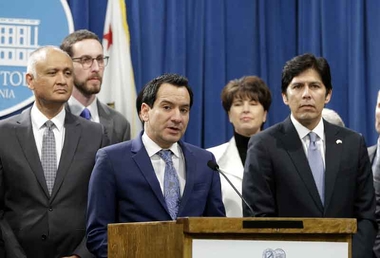Democratic states wary as Trump embarks on victory tour

LOS ANGELES (AP) — As Donald Trump makes his thank-you tour of states that voted for him, other parts of the country are gearing up to do battle with his administration.
Three of the most populous, urban and ethnically diverse states — California, New York and Illinois — voted heavily for Hillary Clinton and are at odds with the incoming administration on such issues as immigration, health care, climate change, abortion rights and gun control.
In Massachusetts, a state Clinton won by more than 25 points, Democratic Attorney General Maura Healey has threatened to sue if the incoming administration carries out Trump campaign promises she contends are unconstitutional. The incoming top law enforcement official in California has hinted at a similar approach.
"If you want to take on a forward-leaning state that is prepared to defend its rights and interests, then come at us," Rep. Xavier Becerra said just hours after he was appointed California's attorney general by Gov. Jerry Brown.
Nothing has stirred more anxiety in the states that voted for Clinton than Trump's statements on immigration. During the campaign, he pledged to deport millions of people in the country illegally and bar Muslims from entering. In Ohio last week, on the first stop in his thank-you tour, Trump reiterated his intent to build "a great wall" along the Mexican border.
On Monday, the California Legislature returned for the first time since the election and passed a resolution urging the Trump administration not to pursue mass deportations. An estimated 2.4 million Californians are immigrants in the U.S. illegally.
Democrats, who hold supermajorities in both houses in California, also announced legislation that would provide lawyers to those in deportation proceedings and train criminal defense attorneys to advise clients on the immigration consequences of their cases.
Assembly Speaker Anthony Rendon said the intent is to put a "firewall" around Californians.
"If you want to get to them, you have to go through us," he said.
In New York, Mayor Bill de Blasio is also pushing back. He said he and Trump talked about immigrants in the country illegally and "exclusionary policies" involving Muslims, among other issues.
"I reiterated to the president-elect that I would be open-minded as we continue substantive discussions, but I would also be vigilant," said de Blasio, a Democrat.
In Chicago, the nation's third-largest city and a Democratic stronghold, Mayor Rahm Emanuel announced $1 million to help people fight deportation. In Rhode Island, Providence Mayor Jorge Elorza has pledged to do whatever the city can to protect residents from being deported for civil immigration violations.
Democrats in California, where Clinton crushed Trump by nearly 4.2 million votes, are especially riled by Trump's presidency. Party leaders said many of the state's priorities of recent years, including its pioneering laws to fight global warming and its efforts to greatly expand health care, are threatened.
California was the first state to embrace the Affordable Care Act and has the largest population of beneficiaries. Trump's threats to repeal and replace the federal health care law could strip coverage for hundreds of thousands of people, Rendon warned.
On his "USA Thank You Tour" — a series of rallies in favorable states that presidential historians say is unprecedented for a president-elect — Trump has mentioned one issue on which there might be broad agreement. Political leaders in Democratic-learning states and cities are encouraged by his proposal to spend $1 trillion on infrastructure.
New York, for example, is looking for billions in federal help to rebuild highways, modernize New York City's subways and construct a new rail tunnel under the Hudson River. Democratic Sen. Charles Schumer, the incoming Senate minority leader, said the first 100 days of a Trump administration "could provide us with a real shot at fixing New York's aging sewers, roads and bridges."
Los Angeles Mayor Eric Garcetti spoke with Trump after the election and described him as "very supportive of our efforts to invest in infrastructure." Downtown Los Angeles is undergoing a building boom, while the region known for gridlocked freeways is expanding rail systems.
Garcetti, a Democrat, said he is not concerned that Trump will favor Republican states with money for building and construction.
"He comes from a blue city in a blue state and more importantly than politics, he comes from a place where people depend on the subway and depend on public transportation to reduce traffic and pollution. So he gets that," the mayor said.
___
Mulvihill reported from Haddonfield, New Jersey.
___
Associated Press writers Sara Burnett in Chicago; Jonathan J. Cooper in Sacramento, California; Frank Eltman on Long Island, New York; Jocelyn Gecker in San Francisco; and Matt O'Brien in Providence, Rhode Island, contributed to this report.
___
Follow Blood at http://twitter.com/michaelrbloodap and Mulvihill at http://twitter.com/geoffmulvihill
By GEOFF MULVIHILL and MICHAEL R. BLOOD, Associated Press
Copyright Associated Press. All rights reserved.
The Gayly - 12/7/2016 @ 11:21 a.m. CST.





